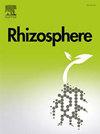Manipulation of root-associated bacterial endophytes for sustainable crop production system: A review
IF 3.4
3区 生物学
Q1 PLANT SCIENCES
引用次数: 0
Abstract
Manipulating endophytic communities offers a promising strategy for enhancing plant growth, stress tolerance, and disease resistance, significantly contributing to sustainable agriculture. Endophytes improve nutrient acquisition, produce growth-promoting hormones, and enhance plant defenses against various stresses and pathogens. Techniques such as specific endophyte inoculation, bio stimulant application, and genetic engineering with CRISPR/Cas9 can optimize these benefits. However, challenges exist, including maintaining specific endophytic communities, understanding their long-term impacts, and ensuring regulatory and safety compliance. High-throughput technologies, such as genomics, transcriptomics, and metabolomics, are crucial for advancing our understanding of endophyte-plant interactions. Integrated approaches that combine these advanced technologies with sustainable agricultural practices, like crop rotation and intercropping, can optimize the benefits of endophytes while mitigating potential risks. Long-term studies and robust regulatory frameworks are necessary to ensure environmental and consumer safety. By addressing these challenges and leveraging advanced scientific tools, the full potential of endophytes in creating resilient and productive agricultural systems can be realized, fostering a more sustainable and efficient approach to farming.
求助全文
约1分钟内获得全文
求助全文
来源期刊

Rhizosphere
Agricultural and Biological Sciences-Agronomy and Crop Science
CiteScore
5.70
自引率
8.10%
发文量
155
审稿时长
29 days
期刊介绍:
Rhizosphere aims to advance the frontier of our understanding of plant-soil interactions. Rhizosphere is a multidisciplinary journal that publishes research on the interactions between plant roots, soil organisms, nutrients, and water. Except carbon fixation by photosynthesis, plants obtain all other elements primarily from soil through roots.
We are beginning to understand how communications at the rhizosphere, with soil organisms and other plant species, affect root exudates and nutrient uptake. This rapidly evolving subject utilizes molecular biology and genomic tools, food web or community structure manipulations, high performance liquid chromatography, isotopic analysis, diverse spectroscopic analytics, tomography and other microscopy, complex statistical and modeling tools.
 求助内容:
求助内容: 应助结果提醒方式:
应助结果提醒方式:


